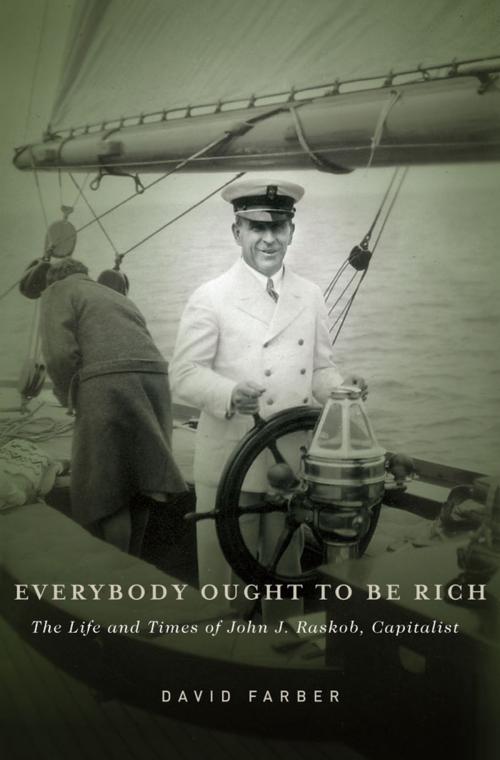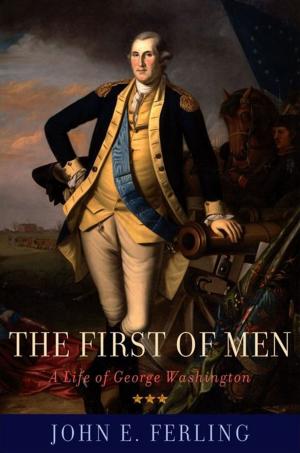Everybody Ought to Be Rich
The Life and Times of John J. Raskob, Capitalist
Nonfiction, History, Americas, United States, 20th Century, Biography & Memoir, Historical| Author: | David Farber | ISBN: | 9780199911622 |
| Publisher: | Oxford University Press | Publication: | April 18, 2013 |
| Imprint: | Oxford University Press | Language: | English |
| Author: | David Farber |
| ISBN: | 9780199911622 |
| Publisher: | Oxford University Press |
| Publication: | April 18, 2013 |
| Imprint: | Oxford University Press |
| Language: | English |
Today, consumer credit, employee stock options, and citizen investment in the stock market are taken for granted--fundamental facts of American economic life. But few people realize that they were first widely promoted by John Jakob Raskob (1879-1950), the innovative financier and self-made businessman who built the Empire State building, made millions for DuPont and General Motors, and helped shape the contours of modern capitalism. David Farber's Everybody Ought to Be Rich is the first biography of Raskob, a man who shunned the limelight (he was the anti-Trump of his time) but whose impact on free market enterprise can hardly be overstated. A colorful figure, Raskob's life evokes the roaring twenties, the Catholic elite, the boardrooms of America's biggest corporations, and the rags-to-riches tale that is central to the American dream. Farber follows Raskob's remarkable trajectory from a teenage candy seller on the railway between Lockport and Buffalo to the pinnacles of wealth and power. With no formal education but possessed of a boundless energy and an unshakeable faith in individual initiative (his motto was "Go ahead and do something!"), Raskob partnered with great industrialists and financiers, buying up companies, leveraging investments, reorganizing corporations, funneling money into the political system, and creating new pools of credit for rich investors and middle class consumers alike--practices commonplace today but revolutionary at the time. His most famous innovation was mass consumer credit, which he offered to individual car buyers, enabling working and middle-class Americans to purchase GM's more expensive cars. Raskob desperately wanted to bridge class divides and to share the wealth American corporations were fast creating--so that everyone could be rich. Chronicling Raskob's short-comings as well as his successes, Everybody Ought to Be Rich illuminates a crucial but little-known figure in American capitalism whose influence can still be felt today.
Today, consumer credit, employee stock options, and citizen investment in the stock market are taken for granted--fundamental facts of American economic life. But few people realize that they were first widely promoted by John Jakob Raskob (1879-1950), the innovative financier and self-made businessman who built the Empire State building, made millions for DuPont and General Motors, and helped shape the contours of modern capitalism. David Farber's Everybody Ought to Be Rich is the first biography of Raskob, a man who shunned the limelight (he was the anti-Trump of his time) but whose impact on free market enterprise can hardly be overstated. A colorful figure, Raskob's life evokes the roaring twenties, the Catholic elite, the boardrooms of America's biggest corporations, and the rags-to-riches tale that is central to the American dream. Farber follows Raskob's remarkable trajectory from a teenage candy seller on the railway between Lockport and Buffalo to the pinnacles of wealth and power. With no formal education but possessed of a boundless energy and an unshakeable faith in individual initiative (his motto was "Go ahead and do something!"), Raskob partnered with great industrialists and financiers, buying up companies, leveraging investments, reorganizing corporations, funneling money into the political system, and creating new pools of credit for rich investors and middle class consumers alike--practices commonplace today but revolutionary at the time. His most famous innovation was mass consumer credit, which he offered to individual car buyers, enabling working and middle-class Americans to purchase GM's more expensive cars. Raskob desperately wanted to bridge class divides and to share the wealth American corporations were fast creating--so that everyone could be rich. Chronicling Raskob's short-comings as well as his successes, Everybody Ought to Be Rich illuminates a crucial but little-known figure in American capitalism whose influence can still be felt today.















